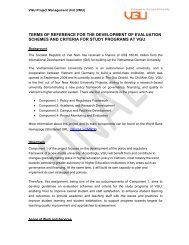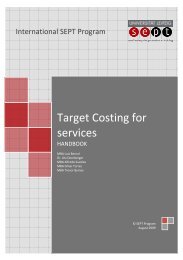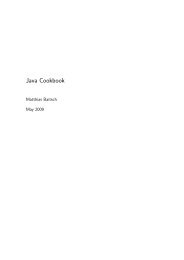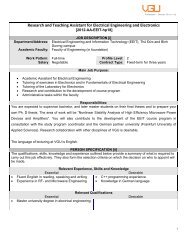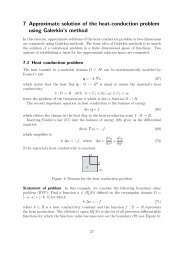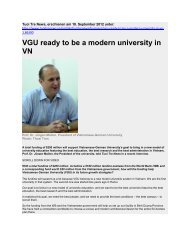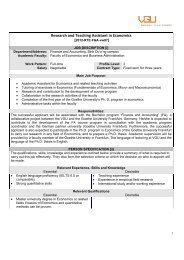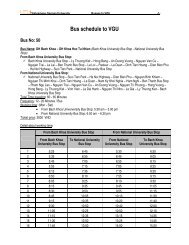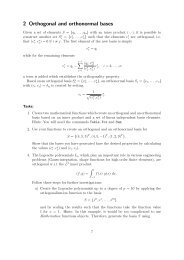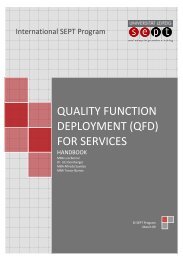VGU Urban Development Planning Overview over Modules and ...
VGU Urban Development Planning Overview over Modules and ...
VGU Urban Development Planning Overview over Modules and ...
You also want an ePaper? Increase the reach of your titles
YUMPU automatically turns print PDFs into web optimized ePapers that Google loves.
Technical University Darmstadt www.urban-studies.de<br />
Course description<br />
1 Course identification<br />
2.5.4-B<br />
2 Module<br />
Conviviality <strong>and</strong><br />
Culture<br />
3 Name of course Cultural production <strong>and</strong> <strong>Urban</strong> Space<br />
4 Course instructor Prof. Dr. Shanti Pillai, New York, Auroville, Havana<br />
5 Contents /syllabus This course explores the role of culture in the production of<br />
globalized urban spaces, <strong>and</strong> the role of urban spaces in<br />
the production of globalized culture. Cultural activities have<br />
long been thought of in the West as the antidotes to the<br />
social ills supposedly promoted by city living. At the same<br />
time, culture constitutes the primary terrain of conflicts <strong>over</strong><br />
social differences <strong>and</strong> urban fears. As the site for the<br />
creation of images, memories <strong>and</strong> meaning, cultural<br />
production symbolizes <strong>and</strong> controls who belongs in the city,<br />
<strong>and</strong> who does not. With the rise of the “global city” <strong>and</strong> its<br />
corresponding concern for finance, service industries, <strong>and</strong><br />
media, culture has increasingly become the business of<br />
urban planners, municipal authorities, <strong>and</strong> corporations who<br />
give priority to the creation of areas of touristic <strong>and</strong><br />
entertainment interest <strong>and</strong> the privatization of public space.<br />
Individual artists <strong>and</strong> small-scale cultural organizations find<br />
it hard to compete in the face of such priorities, just as large<br />
numbers of immigrants <strong>and</strong> ethnic <strong>and</strong> racial “others” are<br />
exploited <strong>and</strong> marginalized by these developments. At the<br />
same time these populations create alternative forms of<br />
“cosmopolitanism” through the production of new cultural<br />
forms, as well as by placing pressure on institutions to<br />
appeal to a broader public. In this class students will<br />
consider the relationship between global economics, local<br />
urban development, <strong>and</strong> the social processes through<br />
which people creatively respond to their living conditions<br />
<strong>and</strong> make claims to “cultural citizenship.” Our discussion<br />
about these contentious issues will include de-centering the<br />
academic debates which have frequently assumed a Euro-<br />
American model of the global city. We will also take note of<br />
the ways in which digital technologies might (or might not)<br />
displace the importance of “place” in the production of<br />
culture in the 21 st century. The course is designed as a<br />
seminar to introduce students to a range of issues to<br />
simulate their thinking about the cities in which they might<br />
find themselves working. Emphasis is less on lecturing <strong>and</strong><br />
passive note-taking, <strong>and</strong> more on teacher-student<br />
collaboration in discussing open-ended theoretical,<br />
practical, <strong>and</strong> political questions. For their final projects<br />
each student will choose a specific area of inquiry <strong>and</strong><br />
2.5.7 Page 1



